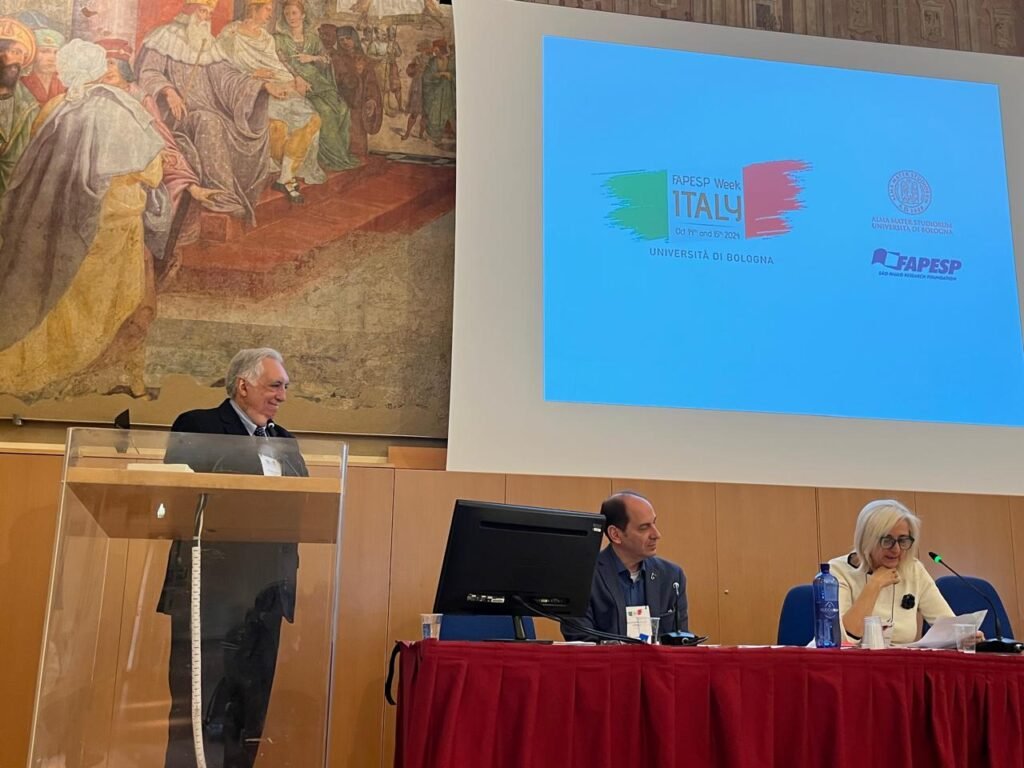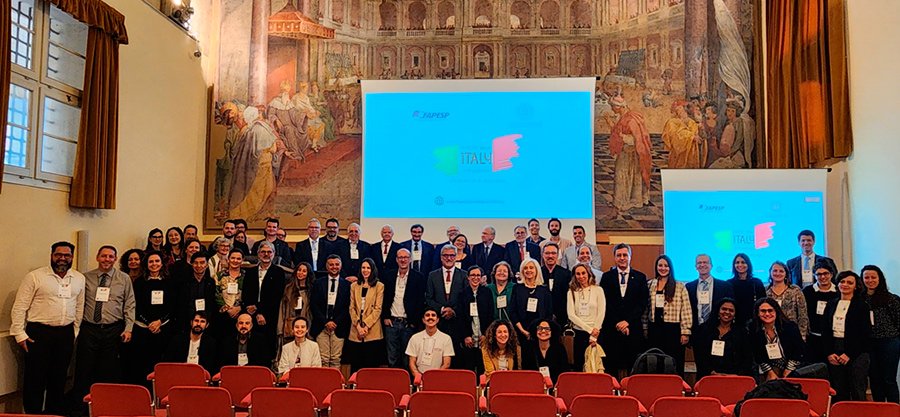The 22nd edition of FAPESP Week, held from October 14 to 15 in Bologna, Italy, brought together around 70 Brazilian and Italian academics with the goal of strengthening scientific partnerships. Among the participants was Dr. Carmino Antonio de Souza, onco-hematologist, professor at the School of Medical Sciences of the State University of Campinas (Unicamp), and principal researcher of CEPID CancerThera.
Souza, who is also vice-president of the São Paulo Research Foundation (FAPESP), highlighted some of the key points of the event, organized in partnership with Alma Mater Studiorum – University of Bologna (Unibo): the work related to the fields of humanities (including museums) and technologies, in addition to startup presentations. “In the health field, the greatest interest was in infections caused by multi-resistant germs (bacteria and fungi),” he explained.
He also gave a brief presentation and spoke with several colleagues about scientific cooperation between Brazil (especially the State of São Paulo) and Italy, also mentioning the research activities developed at CEPID CancerThera.

and vice-president of FAPESP | Photo: Karina Toledo/FAPESP Agency.
Innovation and advancement
Innovation was one of the central themes of the event, especially in initiatives aimed at collaboration between universities and industries. Carlos Américo Pacheco, CEO of FAPESP, highlighted the strength of the science, technology, and innovation ecosystem of the State of São Paulo, which accounts for 43% of Brazil’s national scientific production. “Half of the R&D [research and development] is carried out by companies. This is unique in Latin America, where most research is publicly funded,” said Pacheco.
Marina Silverii, executive director of Attractiveness Research Territory Emilia-Romagna (ART-ER) – a consortium that brings together universities, research institutes, and funding agencies – spoke about the institution’s role in shaping a sustainable future for the Emilia-Romagna region, considered the “engine” of the Italian economy. According to Silverii, most of the 400,000 companies based in the region have fewer than nine employees, many of them being highly innovative and operating in global markets. “Right now, all our energy is focused on helping scale these companies, and that involves expanding international cooperation,” she highlighted.
The presence of startups was another feature of the event, as part of a strategy to bring academia closer to the market. Raul Machado Neto, advisor to the FAPESP Presidency and coordinator of the event, noted the growing importance of this connection in promoting innovation. He highlighted the selection of four recipients of the Innovative Research in Small Businesses Program (PIPE), out of 17 applicants, who were able to interact with representatives of Italian companies during FAPESP Week Italy.
The participation of startups and the focus on innovative technologies such as artificial intelligence and technology transfer were widely discussed. “Since 2012, we have launched 16 startups and 77 spin-offs. They bring our research results to market, create new job opportunities, and generate assets for the local economy,” explained Claudio Melchiorri, delegate for Relations with Companies and Industrial Research at Unibo, emphasizing the role of universities in fostering entrepreneurship.

Brazil–Italy cooperation
Scientific collaboration between Brazil and Italy was another key topic. Marco Antonio Zago, president of FAPESP, emphasized the positive impact of this partnership. “Although there are few institutional agreements, São Paulo is a privileged partner of Italy. The impact of articles published by Italians in partnership with São Paulo scientists is greater than those published in partnership with researchers from the United States,” stated Zago. São Paulo accounts for 53% of all collaborations between both countries.
He reinforced that all FAPESP programs are open to international collaboration and that the event’s goal was to expand these opportunities. “The science and technology system of the State of São Paulo is very complex. We are responsible for over 40% of Brazil’s scientific production. Therefore, this is a broad opportunity to develop joint projects. We have a cooperation agreement with the CNR [National Research Council of Italy] and can support collaborative projects between São Paulo researchers and any Italian institution,” he said.
Zago explained that FAPESP funds research in all fields of knowledge and presented the different support modalities available, with emphasis on the already mentioned PIPEs, the Research, Innovation and Dissemination Centers (CEPIDs), and the Engineering Research Centers (CPEs).
Giovanni Molari, rector of Unibo, in turn, highlighted the historical importance of the relationship between the two countries: “Unibo has built a solid relationship with Brazil, which began more than 30 years ago with the establishment of the Chair of Brazilian Literature. Since then, we have expanded our academic collaboration to many scientific fields.”
More information about FAPESP Week Italy is available at: https://fapesp.br/week/2024/italy
Editing and text: Romulo Santana Osthues | With information and photos by Karina Toledo/Agência FAPESP.




